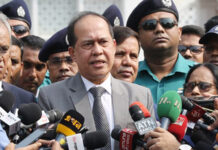
The United Nations Office for Disaster Risk Reduction (UNISDR) head Margareta Wahlstrom in presence of sponsor and chairman of the Nippon Foundation Yohei Sasakawa handed over the prize to the two laureates at the annual summit of Global Platform on Disaster Reduction (GPDR) in Genava on Wednesday, according to a UNISDR web post.
ActionAid Bangladesh country director Farah Kabir and Shanewaz Ali received the Sasakawa award on behalf of NARRI Consortium at the ceremony, sources at ActionAid Bangladesh said.
The National Alliance for Risk Reduction and Response Initiative (NARRI) is an alliance of 10 international NGOs, including Action Aid, Concern Universal, Concern Worldwide, Islamic Relief Worldwide, Oxfam GB and Oxfam Bangladesh.
Belo Horizonte, the capital of Minas Gerais State, Brazil, with a population of 2.75 million, has 80 danger points for floods and several landslide risk areas. It received the Award for fostering cooperation between local residents, public utility companies and private businesses on regular inspection of these potential disaster zones.
The Award was shared with the NARRI, which have demonstrated the scale of impact which can be achieved through working in collaboration. The NARRI has notably developed mass media campaign materials, supported the HFA monitoring process and engaged with communities on disaster risk reduction.
The Tehran Disaster Management and Mitigation Organisation (TDMMO) received a Letter of Distinction for its Amaken Project which encourages residents and office workers to take part in disaster training to mitigate risk at home and in the work-place.
The two laureates — Belo Horizonte and NARRI — received US$20,000 each and the TDMMO received US$10,000.









